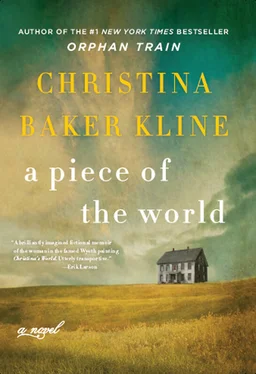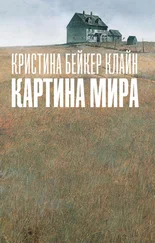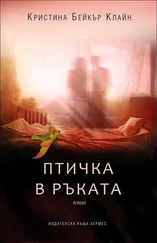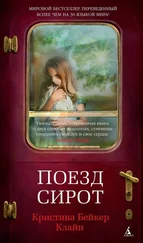1922–1938
In the summers, now, I make my way to the Grange Hall in Cushing most Fridays, but instead of swaying with the music and chatting with friends as they jostle on and off the dance floor, joking and laughing and carrying on, the bolder ones smoking cigarettes outside and tippling from a flask, I am consigned to the role of fruit-punch server, pound-cake cutter, molasses-cookie arranger. I pick up soiled napkins and wash dirty glasses in the sink behind a partition. Most of the women who play this role are older than I am and married. Only a few are my age: the unchosen and childless.
I have not gotten used to it. I’m not sure I ever will. For a while I continue to bring my dress shoes in a bag, as I always have, and put them on as soon as I arrive. But one evening when the hall is particularly hot, I excuse myself from the serving table, go outside, roll my stockings down, slip them off my feet, and put my flat-heeled walking shoes back on. What does it matter?
It’s a damp Friday in August and I’m walking to the Grange Hall with Fred and his fiancée, Lora, wearing a white dress I finished sewing hours earlier from a new McCall’s pattern, when I slip in a rut in the road. I put my hands out to stop my fall, but my arms aren’t stable enough to support my weight. I drop heavily into the muck and gravel, tearing my sleeves, scraping my chin.
“Oh!” Fred shouts, leaping toward me, “Are you all right?”
My chin drips blood, my wrists throb, I am facedown in the wet, soiled dress it took me weeks to sew. The skirt is bunched up round my hips, my bloomers and misshapen legs exposed. Lifting myself slowly on my elbows, I survey my torn bodice. All at once I am so tired of this—of the constant threat of humiliation and pain, the fear of exposure, of trying to act like I’m normal when I’m not—that I burst into tears. No, I am not all right, I want to say. I am fouled, degraded, ashamed. A burden and an embarrassment.
“Can you get up?” Lora asks kindly, standing over me. She crouches down. “Let me help you.”
I turn my face away.
“Doesn’t seem to be a break,” Fred murmurs, running his expert farmer’s hands over my wrists and ankles. “But you’ll have some bruises and swelling, I’m afraid. Poor thing.” He tells me to flex my hands, not the easiest maneuver even when I’m not in pain. When I grimace, he says, “Probably a nasty sprain. No fun at all, but it could be worse.”
Lora waits with me while Fred jogs back to the house to get the car. At home the two of them carry me through the front door and upstairs to my room, where Lora finds my nightgown on a peg and discreetly helps me undress and Fred gently washes my face and arms. Once they’ve shut the door behind them, I burrow into my blankets and turn toward the wall.
How did I go from being the maiden in a fairy tale to a wretched old maid so quickly? It happened almost without my realizing it, the transition to spinsterhood. Mamey said that in her day a woman who had not married by the age of thirty was called a thornback, named after a flat, spiny, prehistoric-looking fish. It’s what they called Bridget Bishop, she said. Thornback. That’s what I have become.
WHEN MOTHER’S HEALTH becomes so precarious that she and Papa need separate bedrooms, I offer to give up mine. She’s in pain; her kidney issues are worse, her legs puffed with fluid. She has started sleeping upright in a parlor chair. I move downstairs, where my bed is a pallet on the dining room floor that I roll up each morning and tuck in the closet. It’s not so bad; I’m closer to the kitchen and the privy, secretly relieved not to have to navigate the stairs.
In the mornings I prepare the noon meal and carry it through the narrow pantry to the round oak table in the dining room for Al and Papa and me, making a separate plate for Al to carry upstairs for Mother. Baked or boiled potatoes, green beans, roast chicken or turkey or ham, a stew of beef and carrots and onions and potatoes. Every few days I make bread with the sourdough starter. Watch the bread rise, punch it down, watch it rise again. In the summer and fall I can the berries Al rakes from their bushes and the strawberries he grows in the garden for jams and jellies, cakes and pies.
We mark the days by the chores that need to be done, the way farm families have always done. Al feeds the hens and horses and pigs, splits wood in the fall, slaughters a pig when the weather turns cold, cuts ice in the winter. I collect eggs from the laying hens and Al drives me into town to sell them. He times the planting so that by the Fourth of July we’ll have new peas and by September there’s a whole field of corn. Gulls lunge for a feast, ravaging the crop, so Al kills a few and hangs them from poles as warning. During haying season in midsummer, I see him from the dining room window in his visored cap, scything the hay by hand with six hired men walking abreast, forking the newly mown hay onto the hayrack. They haul the hay to the barn, where a block-and-tackle hoist lifts it into the mow. Swallows, disrupted from their nests, swoop in and out.
In late July and August, blueberry season, Al uses a heavy steel hand rake to harvest the small dark berries from their low bushes. It’s grueling work, stooping over those low bushes in the hot sun, dumping the berries into a wooden box to be winnowed and weighed, and all summer the back of his neck is burnt and peeling, his knuckles scraped and scarred, his lower back constantly sore.
Aside from the Grange Hall socials, the sewing circle I go to now and then, and the occasional visit with Sadie, I don’t see many people. Most of my old friends and acquaintances are busy with their new husbands and new lives. At any rate, I have little in common with most of the girls I went to school with who are married and having children. I can tell, when we’re together, that they are self-conscious talking about their husbands and pregnancies. But this difference only highlights what has always been true. I’ve never shared either their fluid ease of movement or their quick laughter. My wit—such that it is—has always been more sardonic, stranger, harder to recognize.
Now and then I leaf through the small blue volume of Emily Dickinson poems that my teacher, Mrs. Crowley, pressed into my hand. I remember her words to me when I left school: Your mind will be your comfort.
It is, sometimes. And sometimes it isn’t.
With no one to talk to about the poems, I have to try to parse the meanings myself. It’s frustrating not to be able to discuss them with anybody, but also strangely freeing. The lines can mean anything I want.
Much Madness is divinest Sense—
To a discerning Eye—
Much Sense—the starkest Madness—
’Tis the Majority
In this, as all, prevail—
Assent—and you are sane—
Demur—you’re straightaway dangerous—
And handled with a chain—
I imagine Emily sitting at her small desk, her back to the world. She must’ve seemed very odd to those in her orbit. A little unhinged. Even dangerous, perhaps, asserting, as she does, that it’s the people who lead conventional lives who are the mad ones.
I wonder about that chain that held her. I wonder if it’s the same as mine.
MY CATS, AS cats will do, have kittens. Al takes boxes of them into town and gives away as many as he can, but before long I’m feeding a dozen. They swarm underfoot, mewling and jumping and sometimes hissing at one another. Al grouses about it, pushes them off the table with an open palm, kicks at them when they wind around his legs, mutters about solving the problem with a rock-heavy sack in the pond. “It’s too many, Christie, we’ve got to get rid of them.”
Читать дальше
Конец ознакомительного отрывка
Купить книгу













